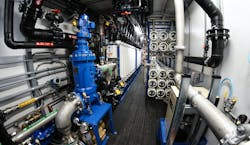MPW Introduces Combined Ultrafiltration, RO Mobile Trailer
MPW Industrial Services introduced the industry’s first combination ultrafiltration-reverse osmosis mobile trailer at the 16th annual American Electric Power Boiler Reliability Optimization Forum (AEP BRO Forum) in Columbus, Ohio, Aug. 2.
Requiring two years of research and development, the technology saves time and money.
“Transportation costs are cut in half because we only need to make one trip to the customer’s plant site instead of two,” said Justin Pierce, director of engineering for MPW’s industrial water division. “In addition, customers only need one power feed. Moreover, less plumbing and electrical wiring is required because we integrate the two systems at our plant. That saves a considerable amount of time during the setup process.”
Pierce said another benefit is the fact the combined ultrafiltration-reverse osmosis trailers require less space than separate systems. “That’s a big consideration whenever a customer is conducting maintenance or repairing their onsite water purification systems,” Pierce said. “Space is often at a premium with so many other contractors all working in the same space at the same time.”
Attendees at the AEP BRO Forum can see the mobile trailer on display in the Greater Columbus Convention Center. The combination technology also is available as permanent installations.
Pierce said the trailer is suited for industrial clients purifying surface water with production requirements of 150 to 300 gpm, but the system also works well with ground and municipal water. “Some even use our combination ultrafiltration-reverse osmosis technology for the further processing of clarifier effluent,” he said.
The technology is capable of purifying water in a single pass up to 300 gpm or double pass at 250 gpm.
The ultrafiltration portion of the system removes total suspended solids, organics, iron, manganese and other contaminants. With two racks and an on-board filtrate tank, the ultrafiltration system provides continuous production even during automated on-board, clean-in-place operations. “This means less downtime and greater productivity,” Pierce said.
Standard instruments include feed and filtrate turbidity, flow rate, pressure sensors, pH, conductivity and water temperature. A programmable logic control system monitors and adjusts conditions to maintain consistent and reliable operations. Remote monitoring and troubleshooting are standard features.
Source: MPW Industrial Services
